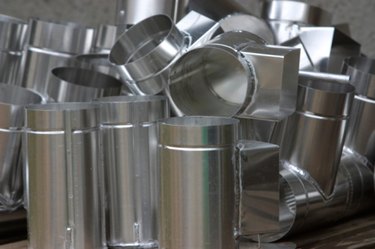
Homeowners often ignore sewer vent pipes, and usually the entire sewer system, until there is a problem or leak. Homeowners often notice a sewer smell as the first indication of a leak in a sewer vent pipe. Detecting the location where the smell originates is more difficult than looking for the wet spot of a sewer pipe leak. This task requires some specialized tools and equipment the homeowner may need to rent.
Step 1
Open the drain system at the cleanout point. This capped opening, most often in the basement or lowest level of the building, allows the introduction of the smoke system into the sewer pipes. Use a pipe wrench to loosen the cap by turning in a counter-clockwise direction.
Video of the Day
Step 2
Block the sewer pipe on the outflow side of the cleanout opening. This is the side of the pipe where the sewage flows towards the sewer main. The cleanout opening is usually located between the area where the household plumbing is concentrated and the wall closest to the street. Use rags or other soft materials to plug the pipe. Make sure the material can be removed after the test is complete.
Step 3
Fasten a smoke-generating machine to the cleanout opening. This device creates an odor free, stain free smoke that it forces, under pressure, into the plumbing system. Under a normal system the smoke will vent through the roof top sewer vent. This vent protrudes through the roof of the home. The vent pipes connect to the plumbing pipes within the home and allow gases to be vented through the roof.
Step 4
Look for points where the smoke exits the piping system within the home. Likely places to check include the joints in the sewer vent and points where other pipes from the sewer system attach to the sewer vent.
Step 5
Block the sewer vent on the roof. This step is optional if the leak is not detected during the previous steps. This allows the pressure within the sewer vent pipe to build increasing the likelihood of smoke venting from the leak.
Tip
Keep in mind the leak in the sewer vent could be anywhere within the sewer vent. If the vent is enclosed within a wall or behind other structures the smoke could build within those areas and be difficult to locate.
Warning
If the pressure within the sewer vent becomes high enough the smoke can force its way through the water in the traps of the plumbing fixtures. In this situation smoke could actually come up through drains in sinks or even through the bowl of a toilet. This can startle people unfamiliar with the testing process.
Video of the Day